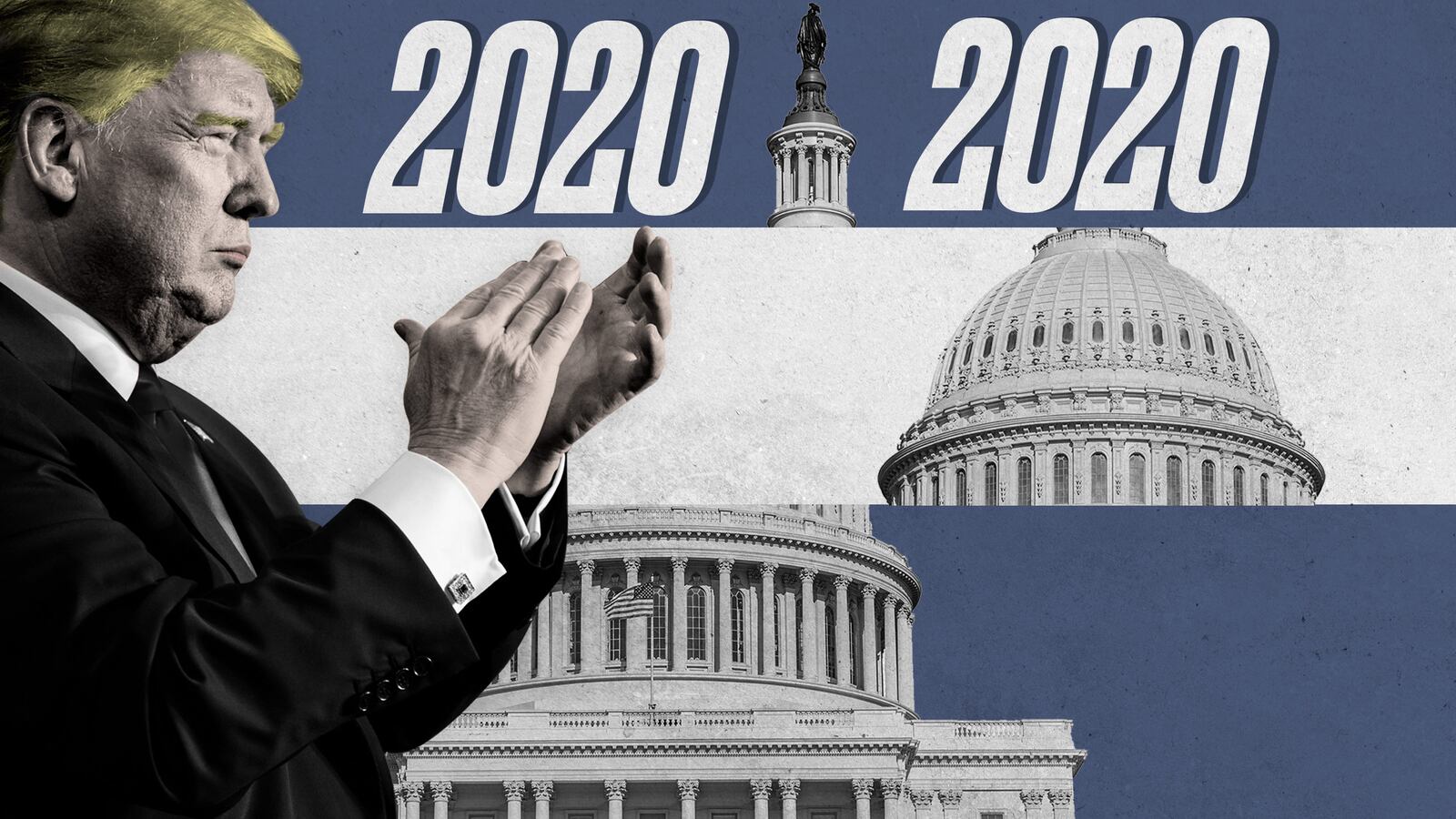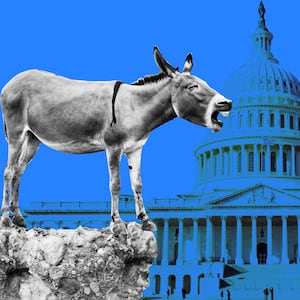The Democratic Party’s capture of the House of Representatives and major state houses last Tuesday should not be understated.
We flipped the most House seats since Watergate and are in a much stronger position heading into redistricting after the 2020 Census. Midterm turnout was the highest it has been in a century; women and young voters turned out and voted Democratic, and from the suburbs of Philadelphia to Salt Lake to Oklahoma City, we won persuadable voters.
Democrats deserve all the bourbon and Bud Lights that were consumed across campaign headquarters last week. But it’s time to sober up and recognize that to win in 2020 this won’t be enough. We’ll need a much deeper vision that lays bare the myth Donald Trump has spun on the economy if we want to win back the White House.
Trump has presented himself as a cultural warrior who claims he will protect American identity, one rooted in an idealized vision of the 1950s, when the coal mines were churning and factories were fully operational and suburban housing was being built wherever we could find a plot of land. He promises to take us back to Levittown. We Democrats have struck back with a platform emphasizing inclusive values and protecting access to health care.
But we’ve yet to answer with our economic alternative and the underlying tensions that led to Trump’s election have yet to be fully addressed. In an economy that is increasingly globalized and automated, many Americans wake up wondering what role they can play and whether their children will have a better future. When corporate profits are up but take-home pay can’t keep up with basic expenses, they wonder whether any politician has a plan that meets their needs.
For voters nationwide, health care access matters; protecting the children of immigrants matters; reducing the cost of higher education matters. But they are not, collectively, enough.
National campaigns aren’t won by ticking off positions on a list of issues. Democrats need a holistic plan.
So what should we offer?
First, we must be realistic. We can’t promise to bring back enough manufacturing jobs to provide for every American searching for a good paying one. We can’t promise corporate jobs will last from your entry level gig through your retirement.
But in an economy that has become increasingly individualized, what we can do is appeal to our history of entrepreneurship to show Americans how to obtain a job that provides for their family if they’re willing to receive the training necessary to perform them. And we have to make clear that the jobs of tomorrow may not be a carbon copy of those available today.
Secondarily, we must make clear that a tax cut is not an economic plan. We should have learned that from George Bush and Donald Trump. If we just campaign on ways to provide supplemental income, we’re only laying out a plan to get by for the next few years, rather than addressing the long-term anxieties that have now persisted for over a decade.
The midterm results in the longstanding Midwest battleground shows us these anxieties remain a factor. We won significant victories in Michigan, Wisconsin, and Pennsylvania but Iowa and Ohio proved harder.
In those states and many others, less educated, mainly white Americans continue to vote Republican, frustrated that incomes for highly educated workers continue to go up and talk of AI replacing human labor is celebrated by executives. To them, talk of targeted tax cuts or an inclusive economy, seems like a middling answer for a chronic condition.
It is here that Democrats have our opportunity. These Americans didn’t benefit from a massive corporate tax cut that didn’t create jobs. They didn’t benefit from a trade war with China that has put our agricultural industry at risk. For all of Trump’s talk about infrastructure, he hasn’t advanced a single initiative that would put a single construction worker back to work. His only successful job creation plan has been for Wall Street executives looking for work in the federal government, and the bellhops at the Trump International Hotel in D.C.
From transforming our education system to providing new career opportunities for workers in declining industries to retirement security that protects today’s mobile workforce, it’s time to define how opportunity can be seized in this era.
One place we can draw inspiration is from Sherrod Brown. My former boss (I worked for his first Senate campaign in 2006) has outperformed other Democrats in Ohio because he laid out a economic vision for a post-industrial economy that latches onto university and talent hubs to help foster the new economy without fully abandoning the old. He fights for tax incentives for consumers to buy American-made products, retraining when a manufacturing hub is lost and investments in clean energy, laddering them up to a message he succinctly defined as “Dignity of Work.” Because it’s not just about your job -- it’s about your ability to provide for your family and walk with your head up in your community.
But there are additional steps to take as well.
Democrats should offer a plan that lays out a clear and achievable job path for students ready to make a career decision: whether pursuing vocational training for a better-paying service, construction or retail jobs, or an advanced manufacturing job that is reliant on developing technological skills. We should also present a platform meant to prepare workers to be nimble and to seize opportunities as they arise. The Bureau of Labor Statistics estimates that the average worker today holds ten different jobs by the time they are forty, a number that is expected to only grow. For transitioning workers, the answer to what’s next may often lies in learning ways to launch your own business that fills a local economic need.
Democrats must talk about securing and capitalizing on America’s unique advantages in today’s global economy. As the internet transitions into a voice controlled one that will bring in the next billion users, we should fight to maintain our dominance on everything from the deployment of 5G broadband, to modernizing the retail experience, to developing a new set of jobs around blockchain.
Democrats can’t just talk about better funding for education. Instead, we must present a plan to adapt our system to meet the rapidly changing demands of tomorrow’s economy. We can’t fund curricula that are dated and serve no professional purpose. But we also must recognize that not everyone will learn how to code and not everyone will become a software engineer. We’ll always need electricians and construction workers and great customer service representatives and we should ensure there is a clear path to these jobs as well.
Democrats must also modernize our retirement security system to ensure that Americans who have contributed a lifetime of work are afforded peace of mind. If corporate pension benefits can’t be relied upon to be as rock solid in the future, we should build a framework for broad based, portable retirement security that protects all workers.
In the end, an economic plan only works if it addresses the complexities and fluidity of the new economy. And it can only be sold by a candidate with charisma, strength and motivational prowess that also can provide assurances of stability to persuadable voters. Campaigning on equality and justice—especially when they’re under assault—remains essential in the age of Trump. But to help bridge the deep cultural divide in America we’ve also got to give voters a sense of stability and a dose of hope, not just about how they’ll fight to get by over the next four years but about how they can truly thrive long term.
These anxieties have persisted long enough that they’ve blended into a discussion about American identity, with voters being convinced that if another group benefits something is being taken away from them. They question whether the American ideal is no longer because they view a changing society as a threat when their financial situation has been stagnant.
We can fight fear and win in 2020 by appealing to Americans’ aspirations with a vision for our workforce that is truly forward looking. If we instead rely on a handful of oft repeated, popular issues that don’t answer the big question, we may once again wake up with Trump at the helm.
Ben LaBolt is a communications strategist and partner at Bully Pulpit Interactive who served on three presidential campaigns and as an adviser to Democrats such as President Barack Obama, Sen. Sherrod Brown, and Mayor Rahm Emanuel.







